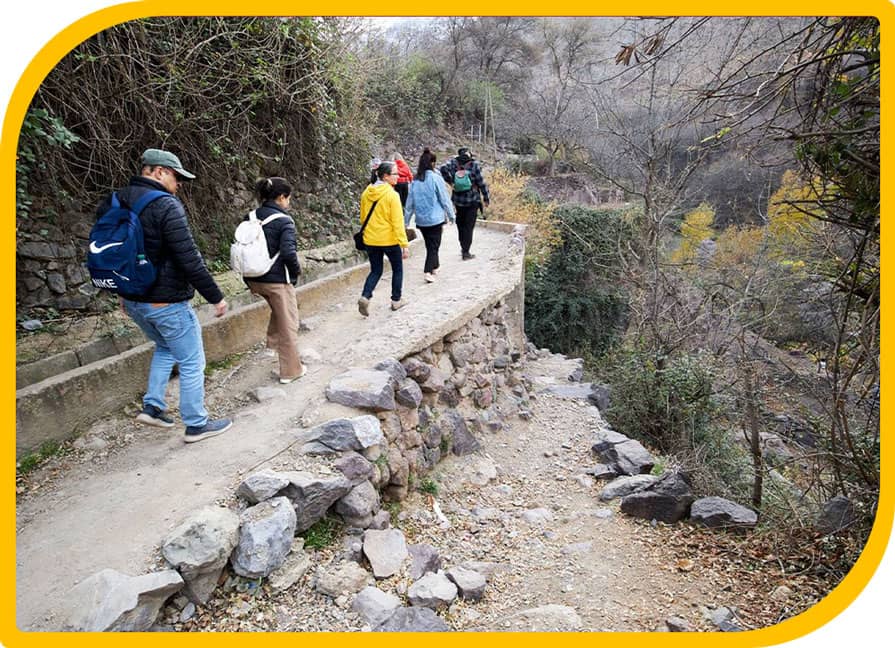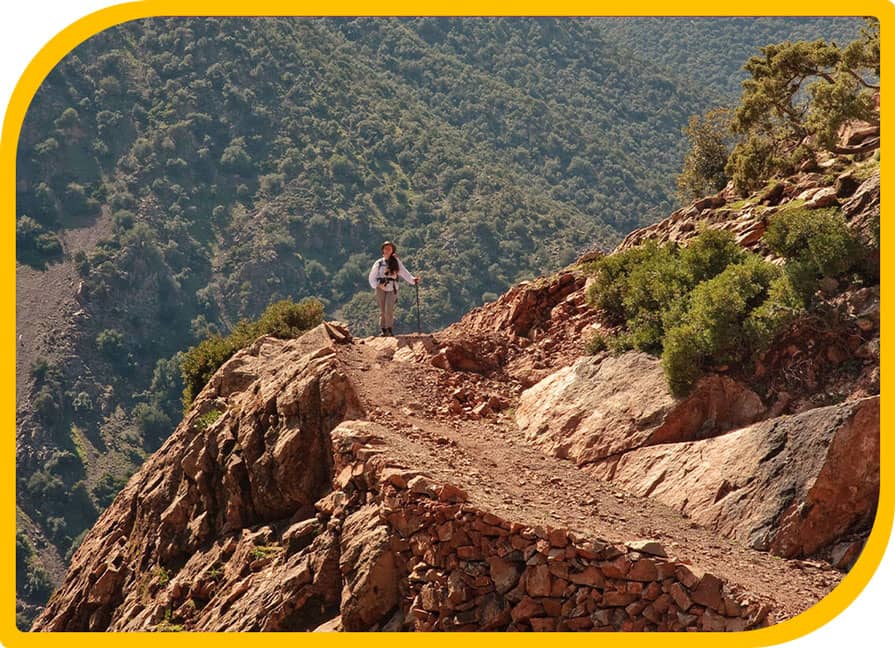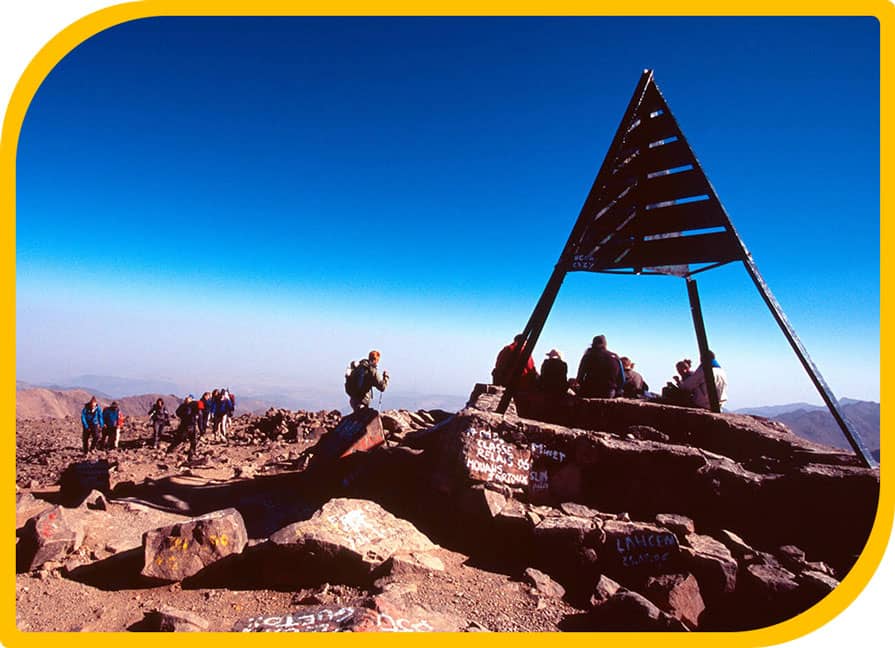Atlas Mountains Trekking Routes for Every Level
Introduction: Discover the Magic of Atlas Mountains Trekking
The Atlas Mountains are Morocco’s breathtaking backbone, stretching over 2,500 kilometers across the country, from the Atlantic coast to the edges of the Sahara Desert. Rugged peaks, deep valleys, cascading waterfalls, and traditional Berber villages make this region a dream destination for nature lovers and adventure seekers alike. Whether you are a seasoned hiker or a first-time trekker, Atlas Mountains trekking offers an unforgettable blend of physical challenge, stunning scenery, and cultural immersion.
Trekking in the Atlas Mountains is more than just walking along trails—it’s an experience that engages all the senses. You’ll encounter vibrant landscapes, from snow-capped summits in winter to lush, flower-filled valleys in spring. Along the way, you’ll meet local Berber communities whose hospitality and traditions provide a fascinating cultural layer to every journey.
This guide is designed to help every type of adventurer find the perfect trek. We’ll explore routes suitable for beginners seeking easy day hikes, intermediates looking for multi-day adventures, and advanced trekkers aiming to conquer Morocco’s highest peaks, including the iconic Mount Toubkal. By the end of this guide, you’ll have all the information you need to plan your ultimate Atlas Mountains trekking experience—from route selection and essential gear to insider tips for a safe and enjoyable journey.
If you’re dreaming of escaping chilly winter weather without traveling halfway across the world, Morocco offers the perfect sunshine-filled getaway. With its diverse landscapes, rich history, and vibrant culture, Morocco is home to some of the best cities to visit in winter for travelers seeking warmth, adventure, and unforgettable experiences. From bustling medinas and colorful souks to serene beaches and golden deserts, winter in Morocco is a season of mild temperatures and bright sunshine—ideal for exploring at your own pace.
In this guide, we’ll explore the top Moroccan cities to visit in winter, highlighting their unique attractions, activities, and experiences that make them perfect for a sunny winter escape. Whether you’re a culture enthusiast, a beach lover, or an adventure seeker, Morocco has a city that will suit your travel style.
Why Trekking in the Atlas Mountains is Unforgettable
Embarking on Atlas Mountains trekking is an adventure like no other. Beyond the physical challenge, it offers a unique combination of natural beauty, cultural encounters, and life-changing experiences. Here’s why trekking in this majestic range should be on every hiker’s bucket list:
1. Stunning Landscapes and Diverse Terrain
The Atlas Mountains boast a dramatic variety of landscapes, from soaring snow-capped peaks to serene valleys, waterfalls, and gorges. Whether you prefer the gentle trails of the Ourika Valley or the rugged ascents toward Mount Toubkal, each trek rewards hikers with panoramic views and ever-changing scenery that feels worlds away from the bustling Moroccan cities.
2. Rich Cultural Experiences
A key highlight of Atlas Mountains trekking is the chance to interact with the Berber communities who have inhabited these mountains for centuries. Along the trails, you’ll encounter traditional villages with earthen houses, sample authentic Moroccan cuisine, and witness local crafts and customs firsthand—making your journey a cultural as well as a natural adventure.
3. Wildlife and Biodiversity
The Atlas Mountains are home to a variety of wildlife, including Barbary macaques, eagles, and rare plant species. Hiking these trails provides not only breathtaking scenery but also opportunities to observe Morocco’s unique flora and fauna in their natural habitat.
4. Seasonal Advantages
Depending on the time of year, Atlas Mountains trekking offers different experiences. Spring brings wildflowers and flowing waterfalls, summer allows access to higher-altitude trails, autumn features colorful foliage and cooler temperatures, and winter offers snow-covered peaks for those seeking a true alpine adventure.
5. A Challenge for Every Level
Whether you are a beginner looking for short, scenic trails or an advanced trekker aiming to summit Mount Toubkal, the Atlas Mountains cater to all skill levels. The variety of routes ensures that everyone can enjoy the thrill of trekking without compromising safety or enjoyment.
Beginner-Friendly Trekking Routes in the Atlas Mountains
For those new to hiking or looking for a relaxed adventure, the Atlas Mountains offer a variety of scenic, easy-to-moderate trails. These beginner-friendly routes allow you to enjoy the region’s natural beauty and cultural charm without the intensity of high-altitude treks.
1. Imlil Valley and Sidi Chamharouch
-
Distance & Duration: 6–8 km round trip, 2–4 hours.
-
Difficulty: Easy
-
Highlights: Gentle trails, panoramic views of the High Atlas, small streams, and the charming village of Sidi Chamharouch.
-
Tips: Wear sturdy walking shoes, bring water, and take breaks to enjoy the scenery. Hiring a local guide can enhance the experience with insights into Berber culture.

2. Toubkal Base Camp Day Hikes
-
Distance & Duration: 5–10 km depending on the trail, half-day to full-day.
-
Difficulty: Easy to moderate
-
Highlights: Stunning mountain views, the opportunity to see snow-capped peaks, and short treks that don’t require overnight camping.
-
Tips: Even on easy hikes, mornings are cooler and less crowded. Layered clothing is recommended as temperatures can vary.
3. Ourika Valley Waterfalls
-
Distance & Duration: 3–7 km round trip, 2–3 hours
-
Difficulty: Easy
-
Highlights: Beautiful waterfalls, lush valley scenery, traditional Berber villages, and small local markets.
-
Tips: Start early to avoid crowds. Wear shoes suitable for wet or slippery paths near waterfalls.
Beginner Trekking Tips:
-
Start with short trails and gradually increase distance and elevation.
-
Carry water, snacks, sunscreen, and a small first-aid kit.
-
Engage with local guides to enhance safety and cultural experiences.
-
Always inform someone about your planned route and expected return time.
Summary: Beginner treks in the Atlas Mountains provide an excellent introduction to the region’s beauty, culture, and adventure. They are perfect for travelers who want to experience nature without intense physical demands.
ntermediate Trekking Routes in the Atlas Mountains
For hikers with some experience seeking multi-day adventures or slightly more challenging terrain, the Atlas Mountains offer several routes that combine breathtaking scenery with rewarding physical activity. These treks often include higher altitudes, varied landscapes, and cultural encounters along the way.
1. Toubkal Ascent (2–3 Days)
-
Distance & Duration: 35–40 km round trip, 2–3 days
-
Difficulty: Moderate
-
Highlights: Summiting North Africa’s highest peak, Mount Toubkal (4,167m), camping in scenic valleys, sunrise and sunset views over the High Atlas, and visiting Berber villages along the trail.
-
Tips: Acclimatize properly before ascending, carry sufficient water, and consider hiring a guide for navigation and safety.

2. Oukaimeden Trails
-
Distance & Duration: 10–15 km per day, 2-day trek typical
-
Difficulty: Moderate
-
Highlights: Rolling hills, wildflower-covered slopes in spring, panoramic mountain vistas, and opportunities for photography.
-
Tips: Start early to enjoy cooler morning temperatures and avoid afternoon heat. Trekking poles are useful for uneven terrain.
3. Azzaden Valley Treks
-
Distance & Duration: 15–20 km per day, 2–3 days
-
Difficulty: Moderate
-
Highlights: Immersive cultural experience in Berber villages, waterfalls, rivers, and scenic trails through orchards and terraced fields.
-
Tips: Engage with local families for authentic experiences. Carry light snacks, and pack layered clothing as temperatures can change quickly.
Intermediate Trekking Tips:
-
Maintain a steady pace and take breaks to avoid fatigue at higher altitudes.
-
Always check weather forecasts; mountain conditions can change rapidly.
-
Ensure proper footwear for rocky or slippery paths.
-
Carry a small daypack with essentials: water, snacks, first-aid kit, map, and layers.
Summary: Intermediate treks in the Atlas Mountains are ideal for adventurers looking to challenge themselves while experiencing the region’s stunning landscapes and rich cultural heritage. These routes provide the perfect balance of activity, scenery, and immersion in Berber life.
Ready to Explore the Atlas Mountains?
Don’t just dream about adventure—experience it! Whether you’re a beginner, intermediate, or seasoned trekker, the Atlas Mountains offer the perfect trail for every explorer. Plan your trek today, choose a route that fits your skill level, and hire a local guide for safety, cultural insight, and unforgettable moments along the way. With the right preparation and gear, every step becomes part of an incredible story. Start your Atlas Mountains trekking adventure now and create memories that will last a lifetime!
Advanced Trekking Routes in the Atlas Mountains
For seasoned hikers seeking challenging terrain, long distances, and high-altitude adventure, the Atlas Mountains offer some of Morocco’s most demanding and rewarding treks. These routes require physical fitness, preparation, and sometimes technical skills, but the experience is unforgettable.
1. Summit of Mount Toubkal (4,167m)
-
Distance & Duration: 35–40 km round trip, 2–3 days
-
Difficulty: Hard
-
Highlights: The ultimate trek in Morocco, breathtaking sunrise and sunset from the summit, dramatic views of the High Atlas, and experiencing the thrill of conquering North Africa’s highest peak.
-
Tips: Start the trek well-acclimatized, use a guide for safety and navigation, and bring warm clothing for summit conditions.

2. M’Goun Massif Expedition
-
Distance & Duration: 50–60 km round trip, 3–5 days
-
Difficulty: Hard
-
Highlights: Rugged terrain, remote Berber villages, spectacular gorges, river valleys, and diverse ecosystems.
-
Tips: Multi-day preparation is essential, carry sufficient food and water, and plan for overnight stays in local guesthouses or tents.
3. High Atlas Crossings
-
Distance & Duration: 60–80 km, 4–6 days
-
Difficulty: Very Hard
-
Highlights: Crossing multiple valleys and passes, encountering diverse landscapes from snow-capped peaks to lush valleys, and experiencing a true backcountry adventure.
-
Tips: Suitable only for experienced trekkers with strong navigation skills. Weather can change rapidly; always inform someone of your route.
Advanced Trekking Tips:
-
Focus on physical training and endurance before attempting these treks.
-
Use a professional guide for safety, especially in remote areas.
-
Carry essential gear: layered clothing, trekking poles, navigation tools, first-aid kit, and emergency supplies.
-
Be prepared for sudden weather changes and high-altitude conditions.
Summary: Advanced routes in the Atlas Mountains challenge both the body and mind, rewarding trekkers with awe-inspiring landscapes and a profound sense of achievement. These treks are perfect for those looking to push their limits while immersing themselves in Morocco’s rugged mountain beauty.
Choosing the Right Trek in the Atlas Mountains
Selecting the right trek is crucial to ensure a safe, enjoyable, and memorable Atlas Mountains trekking experience. With routes ranging from easy day hikes to multi-day high-altitude expeditions, it’s important to match your trek with your fitness level, time, and personal goals.
1. Assess Your Fitness Level
-
Beginner: Short trails with minimal elevation gain, such as Imlil Valley or Ourika Valley.
-
Intermediate: Multi-day hikes with moderate elevation, like Toubkal base camp or Azzaden Valley.
-
Advanced: High-altitude treks and long crossings, including Mount Toubkal summit and M’Goun Massif.
-
Be honest about your stamina and endurance—overestimating can compromise safety and enjoyment.
2. Consider Time and Duration
-
Day Trips: Ideal for beginners or travelers with limited time.
-
2–3 Day Treks: Perfect for intermediates wanting a balance of adventure and cultural immersion.
-
Multi-Day Expeditions: Best for advanced trekkers seeking long-term challenges and remote landscapes.
3. Factor in Season and Weather
-
Spring and autumn offer mild temperatures and optimal trekking conditions.
-
Summer is warmer, but higher-altitude trails remain accessible.
-
Winter provides snow-covered peaks but requires advanced preparation and gear.
4. Decide Between Guided or Self-Guided Treks
-
Guided Treks: Recommended for beginners and advanced routes in remote areas; guides offer safety, navigation, and cultural insights.
-
Self-Guided Treks: Suitable for experienced hikers with strong navigation skills and prior knowledge of the trails.
5. Consider Your Desired Experience
-
Scenic views and photography? Choose routes with panoramic landscapes.
-
Cultural immersion? Opt for trails that pass through Berber villages.
-
Physical challenge? High peaks and long crossings will provide maximum effort and reward.
Summary: Choosing the right trek ensures that your Atlas Mountains trekking adventure is tailored to your abilities, preferences, and schedule. Thoughtful planning maximizes enjoyment while minimizing risks, making your journey safe, memorable, and truly rewarding.
Essential Preparation and Gear for Atlas Mountains Trekking
Proper preparation and the right gear are crucial to ensure a safe, comfortable, and enjoyable Atlas Mountains trekking experience. Whether you are a beginner or an advanced trekker, planning ahead can make all the difference.
1. Clothing Essentials
-
Layered Clothing: Weather in the Atlas Mountains can change quickly. Use base layers for moisture-wicking, insulating layers for warmth, and a waterproof/windproof outer layer.
-
Trekking Pants & Shorts: Lightweight, breathable, and durable for varied terrain.
-
Hiking Socks: Prevent blisters and keep feet dry.
-
Hat & Gloves: For sun protection and colder high-altitude mornings.
2. Footwear
-
Hiking Boots: Sturdy, waterproof boots with good ankle support are essential for rocky or uneven trails.
-
Trail Shoes (Optional): For short, easy hikes in lower valleys.
3. Backpacks and Daypacks
-
Daypack: 20–30 liters for day hikes, carrying water, snacks, camera, and essentials.
-
Multi-Day Backpack: 40–60 liters for multi-day treks, accommodating clothing, sleeping bag, and extra gear.
4. Trekking Equipment
-
Trekking Poles: Help reduce strain on knees, especially on steep ascents and descents.
-
Navigation Tools: Map, compass, GPS device, or smartphone with offline maps.
-
Headlamp/Flashlight: For early starts, late finishes, or emergency situations.
5. Safety and First-Aid Essentials
-
First-aid kit with bandages, antiseptic, blister treatment, and personal medications.
-
Sunscreen and sunglasses to protect against high-altitude sun exposure.
-
Whistle or signaling device for emergencies.
6. Food and Hydration
-
Carry enough water—hydration is critical at higher altitudes.
-
Energy bars, nuts, dried fruit, and lightweight snacks for quick energy.
-
Consider water purification tablets or filters for multi-day treks.
7. Cultural Awareness and Local Etiquette
-
Dress modestly when passing through Berber villages.
-
Ask permission before taking photos of locals.
-
Respect local customs, traditions, and the environment.
Summary: Proper preparation and gear are essential for a successful Atlas Mountains trekking adventure. From clothing and footwear to safety equipment and cultural awareness, planning ahead ensures that your trek is both safe and enjoyable, no matter the route or difficulty level.
Cultural and Scenic Highlights Along the Atlas Mountains Trekking Routes
One of the most rewarding aspects of Atlas Mountains trekking is the perfect blend of natural beauty and rich cultural experiences. Every trail offers unique landscapes, wildlife, and opportunities to connect with local communities.
1. Visiting Berber Villages
-
Trekking through the Atlas Mountains often takes you past traditional Berber villages built from earth and stone.
-
Local villagers are known for their warmth and hospitality; you can enjoy mint tea, learn about traditional crafts, and witness daily life in these remote communities.
-
Participating in cultural activities, such as cooking local dishes or visiting markets, adds depth to your trekking experience.
2. Stunning Natural Landscapes
-
The Atlas Mountains feature dramatic valleys, gorges, and cliffs that provide breathtaking scenery at every turn.
-
Waterfalls, such as those in Ourika Valley or near Imlil, offer perfect photo opportunities and relaxing spots to rest.
-
High-altitude trails provide panoramic views of snow-capped peaks, lush valleys, and terraced fields.
3. Flora and Fauna
-
The mountains are home to diverse plant species, including aromatic herbs, wildflowers, and juniper trees.
-
Wildlife encounters may include Barbary macaques, eagles, and other endemic species, providing an added sense of adventure and discovery.
4. Sunrise and Sunset Viewpoints
-
Many trekking routes feature vantage points that offer spectacular sunrises and sunsets over the High Atlas peaks.
-
Early morning treks are particularly rewarding, with soft light illuminating valleys and rivers.
5. Photography and Mindful Moments
-
The varied landscapes, traditional villages, and dynamic skies make the Atlas Mountains a photographer’s paradise.
-
Take time to pause and absorb the surroundings—trekking here is as much about mindfulness and connection with nature as it is about physical activity.
Summary: Beyond the physical challenge, Atlas Mountains trekking provides rich cultural immersion and unparalleled natural beauty. Every trail offers a chance to experience Berber hospitality, encounter unique wildlife, and witness landscapes that will stay with you long after your trek ends.
Conclusion: Embark on Your Atlas Mountains Trekking Adventure
Whether you are a beginner taking your first steps along gentle valley trails or an experienced hiker aiming to summit Mount Toubkal, Atlas Mountains trekking offers something for everyone. This majestic range combines awe-inspiring landscapes, rich cultural experiences, and challenging routes that make every trek memorable.
From the lush Ourika Valley to the remote peaks of the High Atlas, each journey is a chance to connect with nature, explore traditional Berber villages, and test your physical limits. Careful preparation, the right gear, and choosing a route suited to your fitness level are key to a safe and enjoyable adventure.
Trekking in the Atlas Mountains is more than a hike—it’s a journey that engages all your senses, rewards your efforts with stunning vistas, and leaves you with unforgettable memories of Morocco’s rugged beauty and warm hospitality.
So, lace up your hiking boots, pack your essentials, and set out to explore the trails that make the Atlas Mountains a world-class trekking destination. Your adventure awaits!


